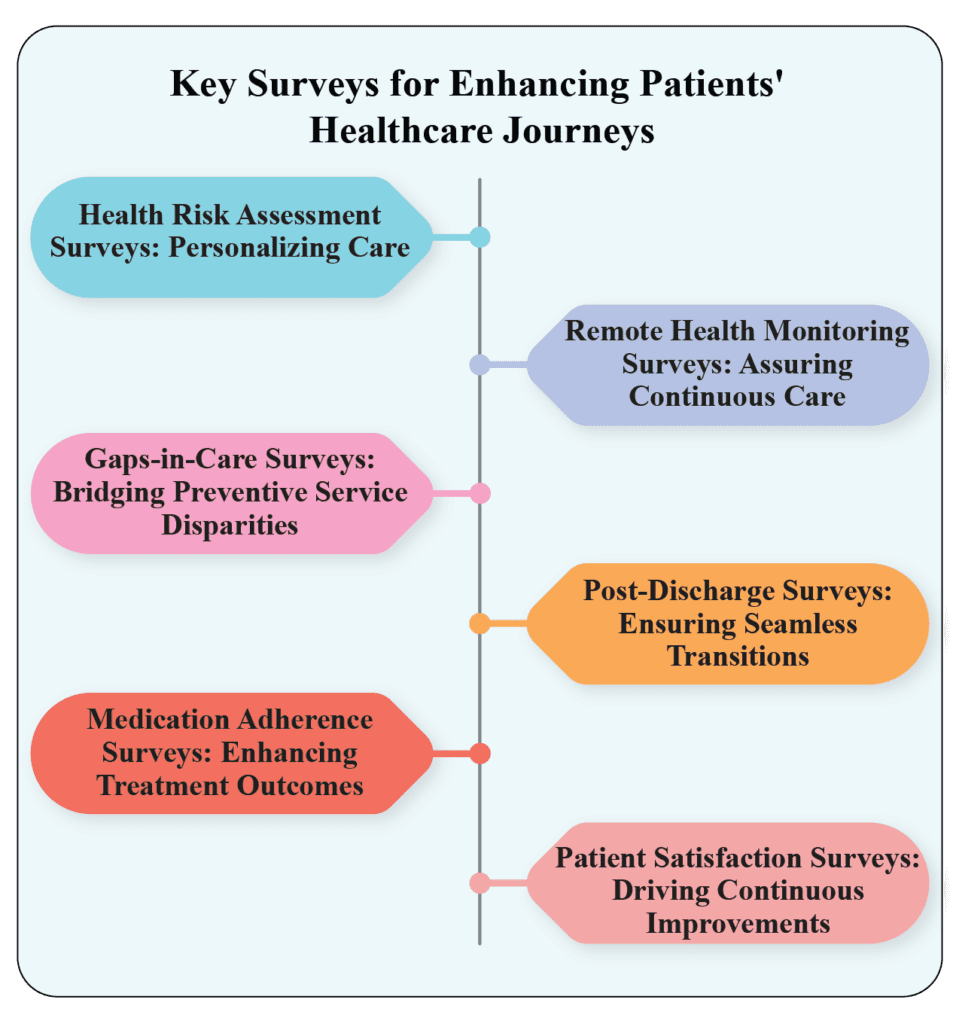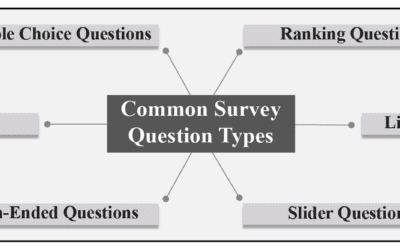Healthcare Survey Role in Enhanced Journey: Personalized Care at its Best
Healthcare Survey : Acquiring feedback on the quality of services and care experienced by patients is an essential data asset for healthcare facilities dedicated to propelling their quality improvement initiatives. One effective approach to evaluate patients’ perceptions is through the use of health surveys. To truly transform the patient experience, healthcare organizations need to shift their focus beyond measuring patient satisfaction and instead concentrate on delivering superior healthcare experiences. One powerful method to achieve this is by expanding the utilization of patient surveys. By moving beyond the traditional approach of solely measuring satisfaction levels, healthcare teams can leverage various types of surveys to drive improved patient experiences.
Key Surveys for Enhancing Patients’ Healthcare Journeys:
- Health Risk Assessment Surveys: Personalizing Care
Health risk assessment surveys allow healthcare teams to identify individual health risks and tailor care based on patients’ specific needs and risk factors. Conducting these healthcare survey just before patients’ annual examinations can be highly effective. By utilizing patient engagement technology, automated text messages can be sent to patients before their appointments, including a link to an online health risk assessment. This provides an opportunity for understanding patients’ needs, discussing health risks during exams, and developing preventive care plans, ultimately contributing to improved patient outcomes.
- Gaps-in-Care Surveys: Bridging Preventive Service Disparities
Gaps-in-care surveys are instrumental in identifying preventive services that patients have not received. These surveys are particularly valuable in engaging healthy patients who may not be actively considering their healthcare or taking preventive actions. By inviting patients to complete gaps-in-care surveys, healthcare teams can identify those who are overdue for preventive services and proactively schedule appointments for screenings and tests, ensuring patients receive the care they need to maintain their good health.
- Medication Adherence Healthcare Survey: Enhancing Treatment Outcomes
Supporting patients with medication adherence is vital for improving healthcare experiences. Medication adherence surveys assess prescription filling, adherence, and potential side effects. Based on patients’ responses, healthcare teams can offer follow-up support to overcome challenges that hinder proper medication intake. This may involve finding more affordable generic alternatives or adjusting dosages to minimize side effects. The goal is to facilitate easy adherence to medication regimens, maximizing the benefits for patients.
- Remote Health Monitoring Surveys: Assuring Continuous Care
Remote health monitoring surveys are versatile tools for monitoring high-risk patients and those with chronic conditions. They enable healthcare teams to assess patients’ progress between visits and evaluate their adherence to treatment plans. These surveys may inquire about health metrics, such as weight or blood sugar levels, and lifestyle habits. By gathering this information, providers can identify patients who require additional support in managing their health and specific chronic conditions, allowing for timely intervention and personalized care.
- Post-Discharge Healthcare Survey: Ensuring Seamless Transitions
An effective survey strategy relies on timing. By reaching out to patients shortly after their hospital discharge, healthcare teams can proactively monitor for any potential issues and prevent readmissions. Follow-up surveys can be sent to patients within 24 to 48 hours after discharge, allowing hospitals to identify and address problems during the critical transition period. Additionally, surveying patients again within the 30-day window following discharge helps capture any issues that may arise during this vulnerable period. Based on survey responses, hospitals can initiate contact, schedule additional check-ins, or provide necessary interventions to minimize the risk of readmission.
- Patient Satisfaction Healthcare Survey: Driving Continuous Improvements
Patient satisfaction surveys remain essential in any comprehensive survey strategy. By utilizing satisfaction surveys alongside the other survey types, healthcare teams can gain valuable insights to drive improvements and enhance overall healthcare experiences. It is crucial to view satisfaction surveys as an integral part of the holistic survey approach, working in tandem with other surveys to achieve comprehensive patient-centered care. By implementing a patient satisfaction survey, healthcare providers can gather essential feedback from patients, facilitating improved communication between patients, physicians, and staff, while creating opportunities for enhancement.
Conclusion
Expanding the utilization of patient surveys is crucial for healthcare organizations aiming to enhance patient experiences. By leveraging various survey types, including health risk assessment surveys, gaps-in-care surveys, medication adherence surveys, remote health monitoring surveys, post-discharge surveys, and patient satisfaction surveys, healthcare organizations can proactively engage patients, personalize care, bridge gaps in preventive services, improve medication adherence, ensure continuous care, and drive continuous improvements. Implementing these advanced survey strategies enables healthcare teams to positively impact patients’ experiences, ultimately leading to better healthcare outcomes.
WorkSure® Sci-précis is a healthcare survey platform that offers a cutting-edge, cloud-based medical IT solution that revolutionizes the way healthcare facilities collect and analyze patient feedback. With our advanced platform, healthcare organizations can seamlessly administer surveys, gather valuable insights on service quality and patient experiences, and drive continuous improvements in care delivery. Our user-friendly interface and robust features enable effortless survey creation, secure data storage, and real-time analytics, empowering healthcare providers to make informed decisions and enhance patient satisfaction.

